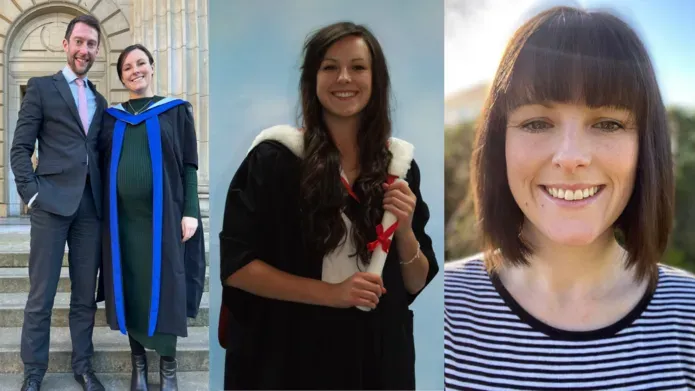News
Honorary Clinical Lecturer's third graduation from School of Medicine
For Dr Joanne Kerins, Dundee School of Medicine has been more than just a place of study, it has been the foundation of her medical career and a source of inspiration for her work in medical education
Published on 11 December 2024

Originally from Glasgow, Joanne first chose Dundee for its unique integration of medical studies with clinical practice, "I liked the way the medical school was part of the hospital, it just felt like a great place to get direct experience," she recalled. Joanne graduated with a BMSc in Anatomy with Forensic Anthropology in 2011, an MBChB in 2013 and now a PhD in 2024
Dundee's state-of-the-art simulation facilities played a pivotal role in shaping Joanne's career path. In her final year of medical school, she participated in a ward simulation exercise that left a lasting impression, "The experience was so immersive and impactful, I can still remember the tasks I was given," That exposure sparked her interest in how simulation training could improve teamwork, communication, and the non-technical skills critical to delivering safe and effective care.
After graduating, Joanne began her career as a junior doctor in Forth Valley, later moving to central Glasgow hospitals and Edinburgh. It was during her time in Edinburgh that she started exploring her interest in teaching and medical education, "Dundee Medical School's strong clinical preparation gave me confidence as a junior doctor, but I noticed some challenges in transitioning to more senior roles, especially around teamwork and communication. That inspired me to delve deeper into simulation training," she explained.
Her passion for simulation-based education only grew as she progressed through her career. By 2019, Joanne had taken a formal role at the simulation centre in Forth Valley, working with internal medicine trainees. This research unexpectedly reconnected back with Dundee, following collaboration across projects involving multiple medical schools. It was a connection that led Joanne back to the City of Discovery to pursue a PhD by publication in Medical Education.
Joanne's PhD, which she completed in just over a year part-time, focused on supporting doctors through key career transitions. From becoming a doctor to specialising and eventually taking on senior roles. She highlighted how simulation can foster a sense of belonging and professional identity during these transitions, vital in addressing current challenges like doctor retention, "Simulation isn't the only tool, but it's a powerful one for helping doctors navigate these pivotal moments in their careers."
Reflecting on her experience at Dundee, Joanne emphasised how welcoming and supportive the University had been throughout her journey, "I've done courses at other institutions, but Dundee always stood out for its sense of community and connection. Even 10 years after graduating, I felt drawn to return," she said.
Joanne's strong bond with Dundee extended beyond the academics. She would often visit the campus to submit work or meet with her supervisors, despite the option to do so remotely. "There's something special about physically coming back. The familiar sights, like the 'blue-carpet area,' it just felt like home," she shared.
Now an Honorary Clinical Lecturer at Dundee, Joanne sees her journey as coming full circle. Her research helps advance simulation-based medical education and underscores Dundee's reputation as a leader in innovative medical training. Joanne said, "Graduating from Dundee for the third time was an incredibly proud moment. It feels like a celebration of everything I've achieved, and it's where so much of this journey began."
Joanne's story is a testament to the impact of Dundee's world-class facilities and supportive academic community, which inspired generations of medical professionals. She hopes her work will encourage future doctors to embrace simulation training and build stronger connections between clinical practice and education.